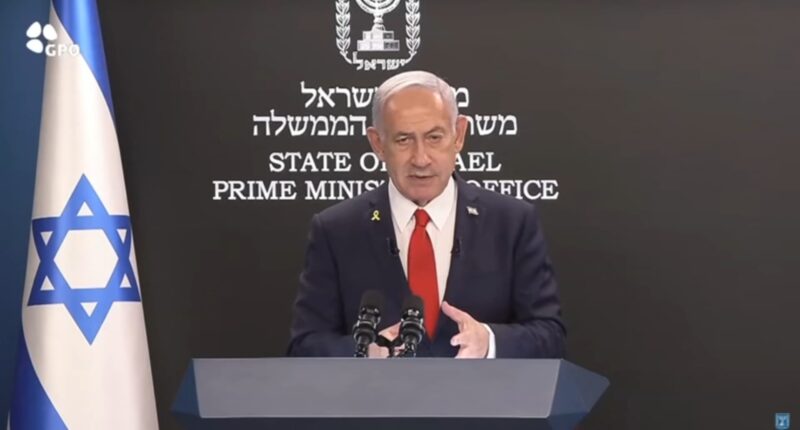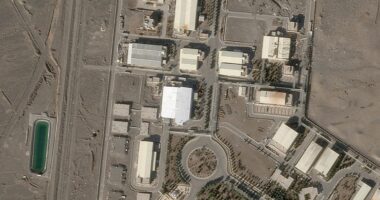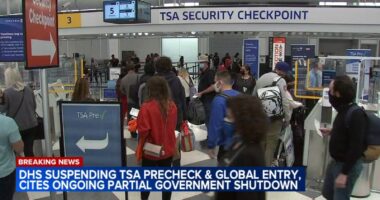Share this @internewscast.com
JERUSALEM — Israeli Prime Minister Benjamin Netanyahu on Sunday defended a new military offensive in Gaza, broader than previously revealed. Facing increasing criticism domestically and internationally, Netanyahu stated that Israel “has no choice but to finish the job and complete the defeat of Hamas.”
Despite growing concerns among Israelis over the ongoing 22-month war, Netanyahu mentioned that the security Cabinet last week ordered the dismantling of Hamas strongholds not only in Gaza City but also in the “central camps” of Muwasi. An insider, speaking anonymously due to lack of media authorization, confirmed that the plan involves operations in both locations.
The densely populated camps were not included in Israel’s announcement of the offensive on Friday. The reason for this omission is unclear, although Netanyahu has faced criticism from his ruling coalition for considering targeting Gaza City alone as insufficient. Netanyahu did mention the establishment of “safe zones,” though past designated areas have faced bombings.
In response to allegations of causing starvation in Gaza and a “global campaign of lies,” Netanyahu addressed foreign media just before an emergency session of the United Nations Security Council, known for expressing outrage but little action regarding the conflict.
“Our goal is not to occupy Gaza, our goal is to free Gaza,” Netanyahu asserted.
He remarked that German Chancellor Friedrich Merz, a staunch supporter of Israel, had “buckled under” international pressure by halting the export of military equipment that could be used in Gaza. Meanwhile, Merz stated on public broadcaster ARD that although Germany and Israel were having critical discussions, the overarching policy of friendship remains unchanged.
Netanyahu indicated a “fairly short timetable” for subsequent actions in Gaza but did not specify details. The objectives, as he mentioned, include demilitarizing the region, ensuring the Israeli military has “overriding security control,” and establishing a non-Israeli civilian administration to manage the area.
Israel also wants to increase the number of aid distribution sites in Gaza, he said, but in a later briefing to local media, he asserted: “There is no hunger. There was no hunger. There was a shortage, and there was certainly no policy of starvation.”
Netanyahu also said he has directed Israel’s military to “bring in more foreign journalists” – which would be a striking development, as they haven’t been allowed into Gaza beyond military embeds during the war.
He again blamed many of Gaza’s problems on the Hamas militant group, including civilian deaths, destruction and aid shortages. “Hamas still has thousands of armed terrorists,” he asserted, adding that Palestinians are “begging” to be freed from them.
Hamas responded with a lengthy statement that summed up Netanyahu’s remarks as “blatant lies.”
U.S. defends Israel at Security Council meeting
The United States defended Israel, saying it has the right to decide what’s best for its security. It called allegations of genocide in Gaza false.
The U.S. has veto power at the council and can block proposed actions there.
Other council members, and U.N. officials, expressed alarm. China called the “collective punishment” of people in Gaza unacceptable. Russia warned against a “reckless intensification of hostilities.”
“This is no longer a looming hunger crisis; this is starvation,” said Ramesh Rajasingham with the U.N. humanitarian office. “Humanitarian conditions are beyond horrific. We have frankly run out of words to describe it.”
More Palestinians killed as they seek aid
At least 31 Palestinians were killed while seeking aid in Gaza, hospitals and witnesses said. The Associated Press spoke to witnesses of gunfire in the Israeli-controlled Morag and Netzarim corridors and the Teina area in the south. All accused Israeli forces of firing at crowds trying to reach food distributions or waiting for convoys.
Fifteen people were killed while waiting for trucks near the Morag corridor that separates the southern cities of Rafah and Khan Younis, according to Nasser hospital.
The situation is a “death trap,” said Jamal al-Laweh, who said Israeli forces opened fire there. “But I have no other choice to feed the kids.”
Six were killed while waiting for aid in northern Gaza near the Zikim crossing, according to Gaza’s Health Ministry and Shifa hospital.
In central Gaza, witnesses said they heard warning shots before fire was aimed toward crowds trying to reach a distribution site operated by the Israeli-backed and U.S.-funded Gaza Humanitarian Foundation. The AP could not independently confirm who fired. Awda hospital said four people were killed by Israeli gunfire.
Six other aid-seekers were killed while trying to reach GHF sites in Khan Younis and Rafah, Nasser hospital said.
The GHF sites opened in May as an alternative to the U.N.-run aid system, but operations have been marred by deaths and chaos.
Responding to AP inquiries, the GHF media office said: “There were no incidents at or near our sites today.” Israel’s military said there were no incidents involving troops near central Gaza aid sites.
Seven people were killed in airstrikes, local hospitals said – three near the fishermen’s port in Gaza City and four, two of them children, in a tent in Khan Younis. Israel’s military did not immediately comment.
Hunger death toll among children hits 100
Israel’s air and ground offensive has displaced most Palestinians and pushed the territory toward famine. Two Palestinian children died of malnutrition-related causes on Saturday, bringing the toll among children to 100 since the war began.
At least 117 adults have died of malnutrition-related causes since June, when the ministry started to count them.
The hunger toll is in addition to the ministry’s war toll of 61,400 Palestinians. The ministry, part of the Hamas-run government and staffed by medical professionals, doesn’t distinguish between fighters or civilians, but says around half of the dead have been women and children. The U.N. and independent experts consider it the most reliable source on war casualties.
Labor strike urged in Israel over looming offensive
Hostages’ relatives have urged a labor strike in Israel next week over the plans to expand military operations in Gaza City, fearing it will endanger their loved ones. Fifty hostages remain after being taken in the Hamas-led attack on Oct. 7, 2023, that sparked the war. Twenty are believed to be alive.
Dozens of people sat outside the U.S. consulate in Jerusalem to protest Israel’s planned offensive. “I think it’s a horrible decision. It’s like deciding that we don’t want (hostages) alive anymore,” said one, Milly Rothschild.
___
Shurafa reported from Deir al-Balah, Gaza Strip, and Magdy from Cairo. Associated Press writers Melanie Lidman in Tel Aviv, Israel; Sally Abou AlJoud in Beirut; Edith M. Lederer at the United Nations and Jamey Keaten in Geneva contributed.
Copyright © 2025 by The Associated Press. All Rights Reserved.
















